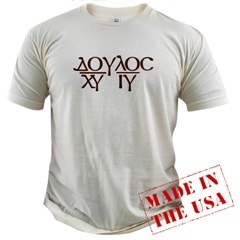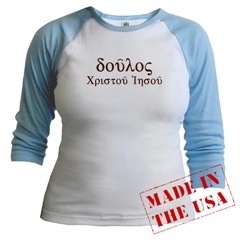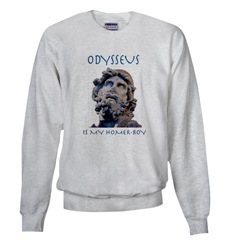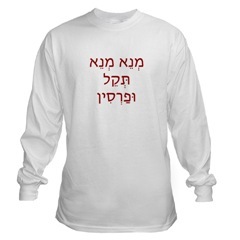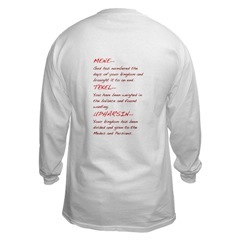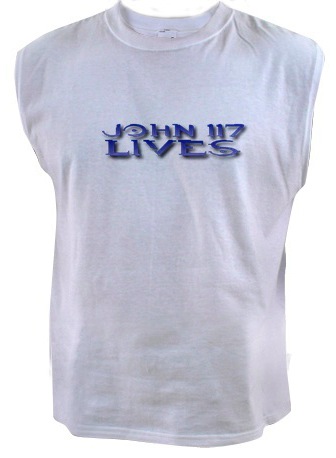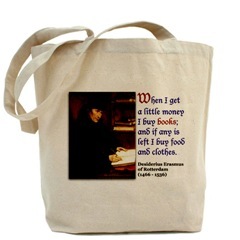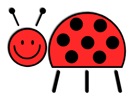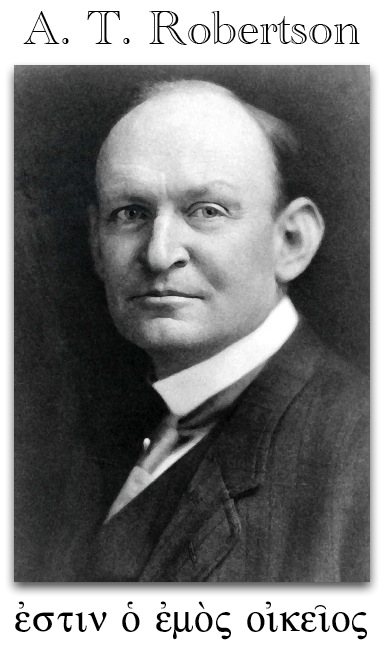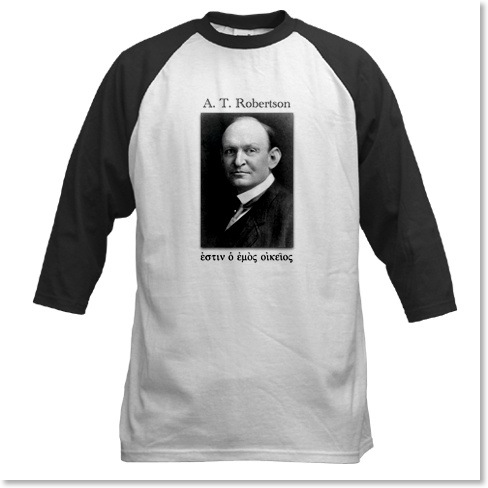Café Press
New Café Press Designs: Greek Uncials, Odysseus, Belshazzar, Halo 3, Latin Sayings, Erasmus and more...
10/11/2007 17:03 Filed in: Personal
I've added a few new designs to the This Lamp Café Press Store in addition to the "A. T. Robertson Is My Homeboy" and This Lamp logo offerings. I'm having fun creating these as certain ideas come to my mind. These are the kind of shirts I've always wanted to find myself, but no one made them. Well, now I make them--or at least Café Press makes them for me. And hopefully, you'll like some of them, too.
And by the way, I've set up more than just shirts. Most of the designs are available with mugs, totebags, bumper stickers, journals, and more.
Servant of Christ Jesus (Greek Uncial)
In Romans 1:1 and Philippians 1:1, the Apostle Paul refers to himself as a doulos Christou Iesou, which is translated "servant [or bondslave] of Christ Jesus."
The design in this section uses an uncial Greek font which is indicative of the time when the New Testament documents were actually written. Shorthand versions of holy names, called "Nomina Sacra" were employed in these manuscripts with lines on top of a two letter abbreviation. What looks like XY and IY is actually the genitive form of the Nominative Sacra of Χριστοῦ Ἰησοῦ or "Christ Jesus."
Servant of Christ Jesus (Greek Standard)
The concept of this shirt is the same as the one above, but the design for this shirt uses a standard Greek font and the accepted presentation found in critical editions of the Greek New Testament.
Odysseus Is My Homer-Boy
This is another take off on the "[Insert Historical Figure Here] Is My Homeboy" designs. If you don't get the pun, you need to take remedial high school English.
The Doom of Belshazzar
Daniel 5 tells the story of Belshazzar, ruler of Babylon, who in a bout of drunkenness insulted the God of Israel.
This shirt has two sides. The first side contains the Hebrew words that God wrote on the palace wall: MENE, MENE, TEKEL, UPHARSIN.
The back side of the shirt contains the interpretation of God's words given to Belshazzar by the prophet Daniel:
MENE--
God has numbered the days of your kingdom and brought it to an end.
TEKEL--
You have been weighed in the balance and found wanting.
UPHARSIN--
Your kingdom has been divided and given to the Medes and Persians.
The words on the front side of the shirt are in Hebrew, and the back side of the shirt includes Daniel's interpretation from Dan 5:26-28 in a handwritten-style (of course!) font. The wording on the back is adapted from the Revised English Bible.
Unfortunately, this shirt's a bit pricier because it has designs on both front and back. Nevertheless, where else would you possibly find a shirt as cool as this?
John 117 Lives
"John 117 Lives" is a takeoff on the "Frodo Lives" bumper stickers, buttons and shirts of the late 1960's. My apologies if I just spoiled the ending of the story for anyone.
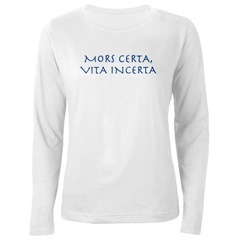 Mors Certa, Vita Incerta
Mors Certa, Vita Incerta
I first read the Latin phrase MORS CERTA, VITA INCERTA not on some ancient Roman inscription, but rather in Philip K. Dick's book Do Android's Dream of Electric Sheep (the basis for the movie Blade Runner).
The phrase means "death is certain; life is uncertain." I've always been struck by how this statement is so brief, yet so profound. It's what separates us from the animals: we know we are mortal and are heading toward an end. In reality, this is the only thing that is constant in life. Everything else may be predicted, but never guaranteed.
I've often suggested that MORS CERTA, VITA INCERTA would make a great epitaph on my tombstone one day--a reminder to those who remain to live life to the fullest, but never to take anything for granted.
Erasmus on Buying Books
Desiderius Erasmus of Rotterdam (October 27, 1466 - July 12, 1536) was a theologian responsible for the first published critical editions of the Greek New Testament, the ones used by both Martin Luther and William Tyndale in their translations.
Further, there's a great quote attributed to Erasmus in which he purportedly said, "When I get a little money I buy books; and if any is left I buy food and clothes."
Some of the items have the quotation to the right of the image of Erasmus, while the items further down are Erasmus alone.
I hope that you'll find these little designs amusing or intriguing enough to pick up for yourself.
You can visit the This Lamp Café Press store at http://www.cafepress.com/thislamp
And Kathy has gotten in on the act by starting a Café Press store related to our upcoming adoption. Be sure to check out http://www.cafepress.com/kolloquy
And by the way, I've set up more than just shirts. Most of the designs are available with mugs, totebags, bumper stickers, journals, and more.
Servant of Christ Jesus (Greek Uncial)
In Romans 1:1 and Philippians 1:1, the Apostle Paul refers to himself as a doulos Christou Iesou, which is translated "servant [or bondslave] of Christ Jesus."
The design in this section uses an uncial Greek font which is indicative of the time when the New Testament documents were actually written. Shorthand versions of holy names, called "Nomina Sacra" were employed in these manuscripts with lines on top of a two letter abbreviation. What looks like XY and IY is actually the genitive form of the Nominative Sacra of Χριστοῦ Ἰησοῦ or "Christ Jesus."
Servant of Christ Jesus (Greek Standard)
The concept of this shirt is the same as the one above, but the design for this shirt uses a standard Greek font and the accepted presentation found in critical editions of the Greek New Testament.
Odysseus Is My Homer-Boy
This is another take off on the "[Insert Historical Figure Here] Is My Homeboy" designs. If you don't get the pun, you need to take remedial high school English.
The Doom of Belshazzar
Daniel 5 tells the story of Belshazzar, ruler of Babylon, who in a bout of drunkenness insulted the God of Israel.
This shirt has two sides. The first side contains the Hebrew words that God wrote on the palace wall: MENE, MENE, TEKEL, UPHARSIN.
The back side of the shirt contains the interpretation of God's words given to Belshazzar by the prophet Daniel:
MENE--
God has numbered the days of your kingdom and brought it to an end.
TEKEL--
You have been weighed in the balance and found wanting.
UPHARSIN--
Your kingdom has been divided and given to the Medes and Persians.
The words on the front side of the shirt are in Hebrew, and the back side of the shirt includes Daniel's interpretation from Dan 5:26-28 in a handwritten-style (of course!) font. The wording on the back is adapted from the Revised English Bible.
Unfortunately, this shirt's a bit pricier because it has designs on both front and back. Nevertheless, where else would you possibly find a shirt as cool as this?
John 117 Lives
"John 117 Lives" is a takeoff on the "Frodo Lives" bumper stickers, buttons and shirts of the late 1960's. My apologies if I just spoiled the ending of the story for anyone.

I first read the Latin phrase MORS CERTA, VITA INCERTA not on some ancient Roman inscription, but rather in Philip K. Dick's book Do Android's Dream of Electric Sheep (the basis for the movie Blade Runner).
The phrase means "death is certain; life is uncertain." I've always been struck by how this statement is so brief, yet so profound. It's what separates us from the animals: we know we are mortal and are heading toward an end. In reality, this is the only thing that is constant in life. Everything else may be predicted, but never guaranteed.
I've often suggested that MORS CERTA, VITA INCERTA would make a great epitaph on my tombstone one day--a reminder to those who remain to live life to the fullest, but never to take anything for granted.
Erasmus on Buying Books
Desiderius Erasmus of Rotterdam (October 27, 1466 - July 12, 1536) was a theologian responsible for the first published critical editions of the Greek New Testament, the ones used by both Martin Luther and William Tyndale in their translations.
Further, there's a great quote attributed to Erasmus in which he purportedly said, "When I get a little money I buy books; and if any is left I buy food and clothes."
Some of the items have the quotation to the right of the image of Erasmus, while the items further down are Erasmus alone.
I hope that you'll find these little designs amusing or intriguing enough to pick up for yourself.
You can visit the This Lamp Café Press store at http://www.cafepress.com/thislamp
And Kathy has gotten in on the act by starting a Café Press store related to our upcoming adoption. Be sure to check out http://www.cafepress.com/kolloquy
|
"A. T. Robertson Is My Homeboy" Apparel and Gifts Now Available
09/21/2007 14:52 Filed in: Faith & Reason
Ever since I first laid eyes on a "Jonathan Edwards Is My Homeboy" t-shirt, I knew I wanted to wear one that honored A. T. Robertson (1863-1934). Therefore, I wish to announce that I have created just such an "A. T. Robertson Is My Homeboy" design which is immediately available on apparel and gift items at my Café Press Store.
However, you may immediately notice that my design is somewhat different than merely being a knockoff of the Edwards shirt. Since A. T. Roberts is so closely associated with New Testament Greek studies, I thought it would be fitting to offer an equivalent Greek rendering of "is my homeboy." At first, I came up with some awkward phrasing that literally said "A. T. Robertson is the boy of my house." This didn't work, so after some thought and consultation, I cracked open the Louw & Nida lexicon which groups words around semantic domains. I began working my way through the section on "kinship terms." Finally, I came across the word, οἰκεῖος, a derivative of the Greek word for home/house [οἶκος] and which means kinsman, relative or member of a household. The word only occurs three times in the New Testament (Gal 6:10; Eph 2:19; 1 Tim 5:8), and I admit it was not part of my working vocabulary. But after looking at it and getting the opinion of a couple of other folks, I decided that in contemporary terms, in a very, very dynamic rendering, οἰκεῖος could be translated as "homeboy." Thus we have "A. T. Robertson ἐστιν ὁ ἐμὸς οἰκεῖος."
A bit of a stretch? Perhaps, but still valid I believe. Plus, like the "Jonathan Edwards is my homeboy" shirt, this is done somewhat tongue in cheek. I imagine such a shirt would draw quite a few stares, as well as being quite the conversation starter for those who get it and for those to whom you have to explain it.
A. T. Robertson was not only one of the greatest Southern Baptist theologians to have ever lived, but he would still probably rank as one of the most significant scholars in the area of modern New Testament Greek studies. After graduating from the Southern Baptist Theological Seminary in Louisville, Kentucky, Robertson was invited to teach at the school where he remained until his death in 1934. During his lifetime, he wrote over 45 books including four Greek grammars. Many of his works are still in print, and some are now thankfully in the public domain and can be accessed as easily as performing an internet search on his name. Robertson is probably best known for his six volume Word Pictures of the New Testament, a work that he wrote with both the reader in mind who knew Greek and the reader who did not. And of course, Robertson's 1500+ page magnum opus, Grammar of the Greek New Testament in the Light of Historical Research has more than stood the test of time. Although dated in some places, it is still a valuable resource and must for any serious student of NT Greek.
There's such a rich legacy of works left behind A. T. Robertson, that I've often thought of creating a podcast simply based on the reading of selections from his writing. In the meantime, if you want to show your appreciation to this great figure Greek studies, be sure to drop by my Café Press store and pick up a shirt, mug, journal or other item and let the world know, "A. T. Robertson ἐστιν ὁ ἐμὸς οἰκεῖος."
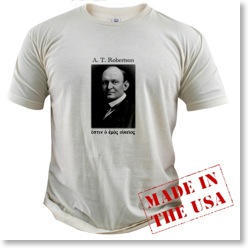
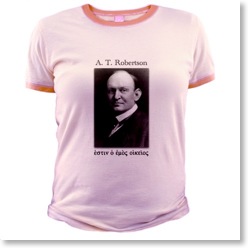
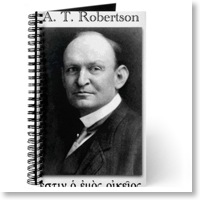
However, you may immediately notice that my design is somewhat different than merely being a knockoff of the Edwards shirt. Since A. T. Roberts is so closely associated with New Testament Greek studies, I thought it would be fitting to offer an equivalent Greek rendering of "is my homeboy." At first, I came up with some awkward phrasing that literally said "A. T. Robertson is the boy of my house." This didn't work, so after some thought and consultation, I cracked open the Louw & Nida lexicon which groups words around semantic domains. I began working my way through the section on "kinship terms." Finally, I came across the word, οἰκεῖος, a derivative of the Greek word for home/house [οἶκος] and which means kinsman, relative or member of a household. The word only occurs three times in the New Testament (Gal 6:10; Eph 2:19; 1 Tim 5:8), and I admit it was not part of my working vocabulary. But after looking at it and getting the opinion of a couple of other folks, I decided that in contemporary terms, in a very, very dynamic rendering, οἰκεῖος could be translated as "homeboy." Thus we have "A. T. Robertson ἐστιν ὁ ἐμὸς οἰκεῖος."
A bit of a stretch? Perhaps, but still valid I believe. Plus, like the "Jonathan Edwards is my homeboy" shirt, this is done somewhat tongue in cheek. I imagine such a shirt would draw quite a few stares, as well as being quite the conversation starter for those who get it and for those to whom you have to explain it.
A. T. Robertson was not only one of the greatest Southern Baptist theologians to have ever lived, but he would still probably rank as one of the most significant scholars in the area of modern New Testament Greek studies. After graduating from the Southern Baptist Theological Seminary in Louisville, Kentucky, Robertson was invited to teach at the school where he remained until his death in 1934. During his lifetime, he wrote over 45 books including four Greek grammars. Many of his works are still in print, and some are now thankfully in the public domain and can be accessed as easily as performing an internet search on his name. Robertson is probably best known for his six volume Word Pictures of the New Testament, a work that he wrote with both the reader in mind who knew Greek and the reader who did not. And of course, Robertson's 1500+ page magnum opus, Grammar of the Greek New Testament in the Light of Historical Research has more than stood the test of time. Although dated in some places, it is still a valuable resource and must for any serious student of NT Greek.
There's such a rich legacy of works left behind A. T. Robertson, that I've often thought of creating a podcast simply based on the reading of selections from his writing. In the meantime, if you want to show your appreciation to this great figure Greek studies, be sure to drop by my Café Press store and pick up a shirt, mug, journal or other item and let the world know, "A. T. Robertson ἐστιν ὁ ἐμὸς οἰκεῖος."



This Lamp Café Press Store Now Open for Business
09/20/2007 10:32 Filed in: Miscellaneous
I've set up a Café Press Store for apparel and such related to This Lamp. You can find it at https://www.cafepress.com/thislamp. The first offerings made available relate strictly to the website itself, including the lamp & library logo:
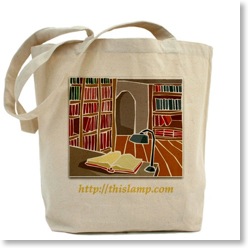
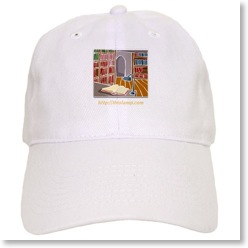
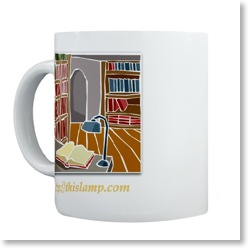
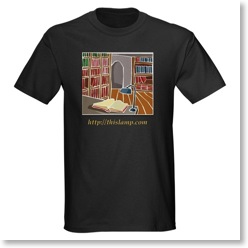
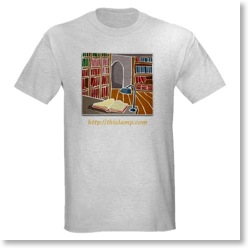
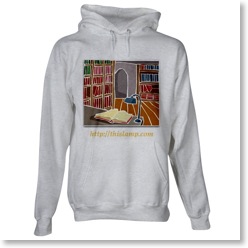
In all there are over 50 items already available with the This Lamp log including mugs, book backs, and all manner of apparel for men, women, children, toddlers and even your pet.
The logo items are just the beginning. Part of my desire with the Café Press Store is to create really cool items related to biblical history, language and more--the kind of stuff I'd like to wear myself, but never see anywhere else. Later this afternoon, or tomorrow at the latest, I'm going to offer the first real project at the store, which I think many of you are going to get a kick out of.
Am I making a profit? Yes, but very little. I placed what I felt was a very modest markup on the items, and then I went back and made it even more modest. Although I think I have some good ideas, you never really know until you throw it out there. My hope is that the offerings I'm going to make in the future might get popular enough that it could provide a little bit of suplemental income--especially as we're gearing up to make a trip to China next year for our adoption.
You're not going to ever see anything like random Google ads are anything on This Lamp. Yes, there may be items such as these from Café Press and sometimes from Amazon, but these are extremely specific, and will always be something--as in the case of the above items--that I would use or wear myself. And I will.
So stay tuned, and check the store often. There's now a link in the menu at the top left. And if you have any ideas, feel free to send them along.






In all there are over 50 items already available with the This Lamp log including mugs, book backs, and all manner of apparel for men, women, children, toddlers and even your pet.
The logo items are just the beginning. Part of my desire with the Café Press Store is to create really cool items related to biblical history, language and more--the kind of stuff I'd like to wear myself, but never see anywhere else. Later this afternoon, or tomorrow at the latest, I'm going to offer the first real project at the store, which I think many of you are going to get a kick out of.
Am I making a profit? Yes, but very little. I placed what I felt was a very modest markup on the items, and then I went back and made it even more modest. Although I think I have some good ideas, you never really know until you throw it out there. My hope is that the offerings I'm going to make in the future might get popular enough that it could provide a little bit of suplemental income--especially as we're gearing up to make a trip to China next year for our adoption.
You're not going to ever see anything like random Google ads are anything on This Lamp. Yes, there may be items such as these from Café Press and sometimes from Amazon, but these are extremely specific, and will always be something--as in the case of the above items--that I would use or wear myself. And I will.
So stay tuned, and check the store often. There's now a link in the menu at the top left. And if you have any ideas, feel free to send them along.










